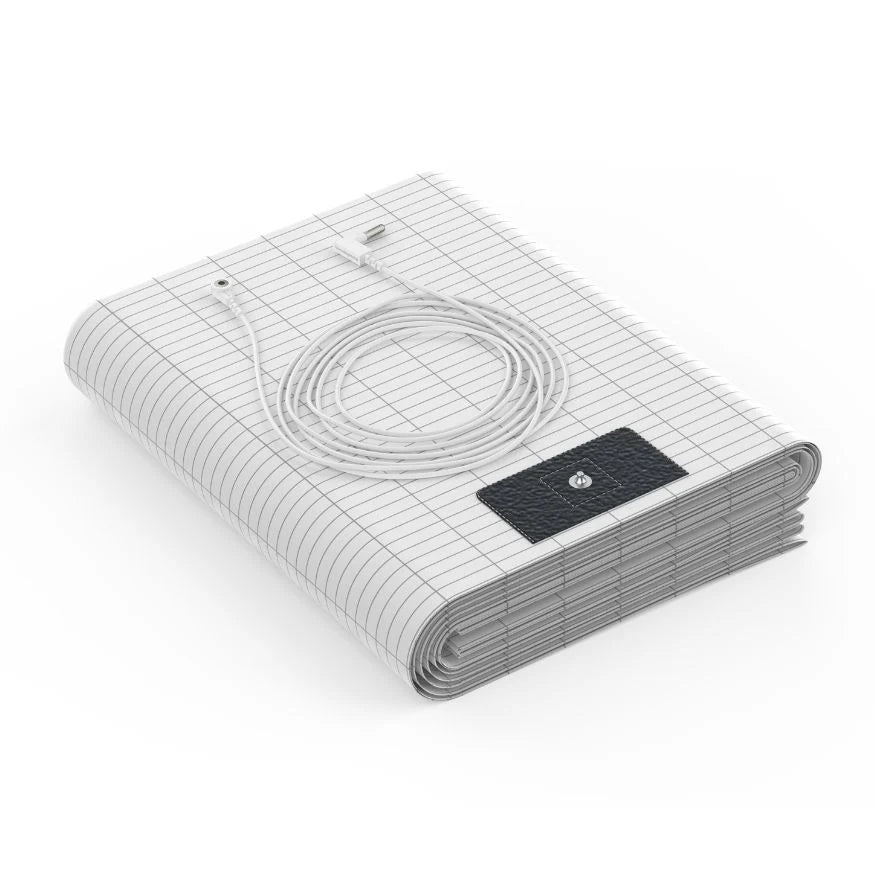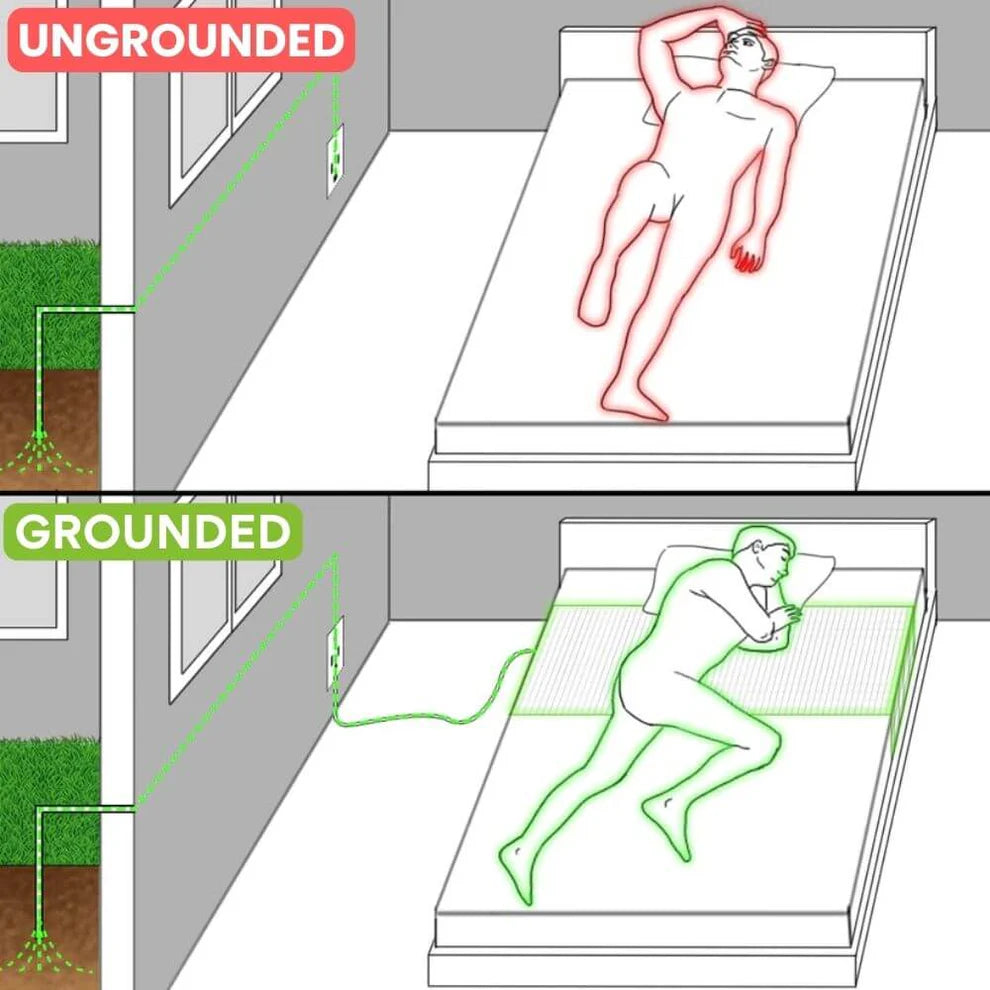The Science Behind Grounded Sleep
Why Reconnecting to the Earth Might Be the Missing Link in Your Healing

Overview: What Is Grounding?
Grounding — also known as earthing — refers to the process of reconnecting the human body to the Earth’s natural electrical field. This can occur through direct skin contact with the ground or via specially engineered conductive materials that replicate the effect indoors.
Scientific evidence suggests that this contact may influence various physiological processes, including inflammation, sleep quality, and nervous system regulation.
“Like any modern device, the human body is electrical — and may benefit from regular grounding.”
What the Research Says
Modern lifestyles have distanced us from direct contact with the Earth. We live in high-rises, wear rubber-soled shoes, and sleep on insulated mattresses — all of which disrupt a connection that was once constant.
Over the past two decades, more than 25 peer-reviewed studies have explored how grounding affects:

- Inflammatory markers
- Cortisol levels and circadian rhythm
- Heart Rate Variability (HRV)
- Blood viscosity and immune response
- Subjective pain and sleep quality
One clinical study found that grounded sleep normalized cortisol secretion patterns in adults with stress-related sleep dysfunction.
(Ghaly & Teplitz, 2004)
Others have reported measurable reductions in pain and inflammation, improved HRV scores, and enhanced parasympathetic activity.
(Chevalier et al., 2012; Brown et al., 2015)
The Biological Mechanism
The Earth’s surface carries a subtle negative charge in the form of free electrons. When the body is grounded, these electrons may:
- Reduce oxidative stress by neutralizing free radicals
- Support cellular repair and tissue regeneration
- Modulate inflammatory pathways
- Influence autonomic nervous system balance via vagal tone
Emerging data suggest that regular grounding may help restore a natural electrical baseline — one that supports rest, repair, and recovery.
Featured Study: Grounding and Inflammation
A Double-Blind Clinical Trial Worth Noting
In a 2015 randomized controlled pilot trial, participants with chronic pain and poor sleep were assigned to grounded or placebo sleeping mats. After just four weeks, the grounded group demonstrated:

- Significant improvements in sleep quality
- Reduced pain scores
- Normalized diurnal cortisol rhythms
“Sleeping grounded normalizes the daily cortisol cycle and improves sleep and pain symptoms.”
— Chevalier et al., Journal of Inflammation Research
This trial reflects a broader pattern across studies: physiological outcomes that go beyond subjective impression.
Frequently Asked Questions About Grounding Science
Is this scientifically proven?
Grounding has been examined in more than two dozen peer-reviewed publications. While additional large-scale studies are needed, the current body of research shows consistent trends pointing toward improved sleep, reduced inflammation, and improved autonomic regulation.
How does it work?
Grounding enables the transfer of free electrons from the Earth’s surface into the body. These electrons may act as antioxidants, influencing inflammatory responses and stabilizing bioelectrical systems such as the nervous and endocrine systems.
Is it safe to use a grounded outlet?
Yes. Grounding products connect exclusively to the grounding port of a standard outlet. No current flows into the body. Reputable grounding sheets include a tester to verify safe grounding before use.
Could this just be placebo?
Placebo can influence perception, but studies have demonstrated objective changes such as lowered cortisol, improved HRV, and measurable reductions in systemic inflammation. These outcomes suggest grounding effects are physiological, not merely psychological.
Common Misconceptions
“Grounding turns you into an antenna.”
Grounding actually reduces the electric potential on the body caused by ambient EMFs. Rather than increasing exposure, it helps discharge built-up voltage.
“There’s no real research behind this.”
Grounding studies appear in journals such as the Journal of Environmental and Public Health, Journal of Inflammation Research, and Journal of Alternative and Complementary Medicine. The field is emerging — but the early evidence is compelling.
“You have to believe in it for it to work.”
Grounding is a physical, not psychological, process. Electrons transfer regardless of belief. Objective outcomes like blood markers and HRV shifts do not depend on perception.
What the Science Suggests
Current evidence indicates that consistent grounding during sleep may:
- Support deeper, more restorative sleep
- Reduce pain related to inflammation
- Improve nervous system regulation (HRV, vagal tone)
- Normalize cortisol cycles and stress recovery
- Enhance biological recovery without supplements or medication
Grounding is a non-invasive, low-risk, and biologically plausible approach to health — especially for individuals seeking alternatives to conventional methods.
Explore the Research Further

Overview: What Is Grounding?
Grounding — also known as earthing — refers to the process of reconnecting the human body to the Earth’s natural electrical field. This can occur through direct skin contact with the ground or via specially engineered conductive materials that replicate the effect indoors.
Scientific evidence suggests that this contact may influence various physiological processes, including inflammation, sleep quality, and nervous system regulation.
“Like any modern device, the human body is electrical — and may benefit from regular grounding.”
What the Research Says
Modern lifestyles have distanced us from direct contact with the Earth. We live in high-rises, wear rubber-soled shoes, and sleep on insulated mattresses — all of which disrupt a connection that was once constant.
Over the past two decades, more than 25 peer-reviewed studies have explored how grounding affects:

- Inflammatory markers
- Cortisol levels and circadian rhythm
- Heart Rate Variability (HRV)
- Blood viscosity and immune response
- Subjective pain and sleep quality
One clinical study found that grounded sleep normalized cortisol secretion patterns in adults with stress-related sleep dysfunction.
(Ghaly & Teplitz, 2004)
Others have reported measurable reductions in pain and inflammation, improved HRV scores, and enhanced parasympathetic activity.
(Chevalier et al., 2012; Brown et al., 2015)
The Biological Mechanism
The Earth’s surface carries a subtle negative charge in the form of free electrons. When the body is grounded, these electrons may:
- Reduce oxidative stress by neutralizing free radicals
- Support cellular repair and tissue regeneration
- Modulate inflammatory pathways
- Influence autonomic nervous system balance via vagal tone
Emerging data suggest that regular grounding may help restore a natural electrical baseline — one that supports rest, repair, and recovery.
Featured Study: Grounding and Inflammation
A Double-Blind Clinical Trial Worth Noting
In a 2015 randomized controlled pilot trial, participants with chronic pain and poor sleep were assigned to grounded or placebo sleeping mats. After just four weeks, the grounded group demonstrated:

- Significant improvements in sleep quality
- Reduced pain scores
- Normalized diurnal cortisol rhythms
“Sleeping grounded normalizes the daily cortisol cycle and improves sleep and pain symptoms.”
— Chevalier et al., Journal of Inflammation Research
This trial reflects a broader pattern across studies: physiological outcomes that go beyond subjective impression.
Frequently Asked Questions About Grounding Science
Is this scientifically proven?
Grounding has been examined in more than two dozen peer-reviewed publications. While additional large-scale studies are needed, the current body of research shows consistent trends pointing toward improved sleep, reduced inflammation, and improved autonomic regulation.
How does it work?
Grounding enables the transfer of free electrons from the Earth’s surface into the body. These electrons may act as antioxidants, influencing inflammatory responses and stabilizing bioelectrical systems such as the nervous and endocrine systems.
Is it safe to use a grounded outlet?
Yes. Grounding products connect exclusively to the grounding port of a standard outlet. No current flows into the body. Reputable grounding sheets include a tester to verify safe grounding before use.
Could this just be placebo?
Placebo can influence perception, but studies have demonstrated objective changes such as lowered cortisol, improved HRV, and measurable reductions in systemic inflammation. These outcomes suggest grounding effects are physiological, not merely psychological.
Common Misconceptions
“Grounding turns you into an antenna.”
Grounding actually reduces the electric potential on the body caused by ambient EMFs. Rather than increasing exposure, it helps discharge built-up voltage.
“There’s no real research behind this.”
Grounding studies appear in journals such as the Journal of Environmental and Public Health, Journal of Inflammation Research, and Journal of Alternative and Complementary Medicine. The field is emerging — but the early evidence is compelling.
“You have to believe in it for it to work.”
Grounding is a physical, not psychological, process. Electrons transfer regardless of belief. Objective outcomes like blood markers and HRV shifts do not depend on perception.
What the Science Suggests
Current evidence indicates that consistent grounding during sleep may:
- Support deeper, more restorative sleep
- Reduce pain related to inflammation
- Improve nervous system regulation (HRV, vagal tone)
- Normalize cortisol cycles and stress recovery
- Enhance biological recovery without supplements or medication
Grounding is a non-invasive, low-risk, and biologically plausible approach to health — especially for individuals seeking alternatives to conventional methods.
Explore the Research Further

100-Night Risk-Free Trial
Try it at home — no pressure, no pills




- Choosing a selection results in a full page refresh.
- Opens in a new window.

